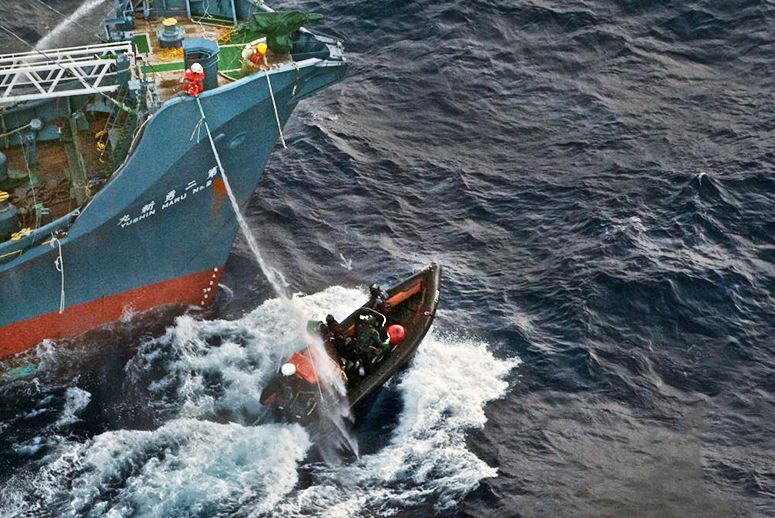
OVERVIEW
MANAGEMENT
PERFORMANCE
POSSIBILITIES
CAPITALS
ACTIVITIES
ACTORS
BURGESS
Fisheries |
|
Burgess COMMENTARY |
|
Sea Shepherd Conservation Society agreed to pay $2.55 million to Japan's Institute of Cetacean Research on Monday as part of a settlement to resolve a long-standing legal battle over the anti-whaling group’s tactics against Japanese whaling ships in the Antarctic. The settlement came the same day the U.S. Supreme Court refused to hear Sea Shepherd’s appeal of a federal court’s finding that the group was in contempt of a court order to stay clear of Japanese whaling ships. The activist group’s tactics at sea include throwing smoke bombs at Japanese whaling ships and using metal-reinforced ropes to damage propellers and rudders. The question is whether those tactics—which typically take place in international waters—amount to piracy, and whether a U.S. court can order those activities to be stopped if they take place outside its jurisdiction. Sea Shepherd believes the court can’t, but the U.S. Court of Appeals for the Ninth Circuit Court upheld that it can. Now, thanks to the settlement, Sea Shepherd will be giving millions of dollars to an organization it has tirelessly battled against in a fight to save the whales. “Sea Shepherd believes that it complied with the Ninth Circuit injunction and does not agree with the holding that it was in contempt,” said Claire Loebs Davis, Sea Shepherd’s legal counsel. “This settlement resolves the issue of damages resulting from those contempt findings and allows us to put this issue that we have been litigating for more than two years finally behind us.” The settlement stems from an ICR lawsuit filed in 2011 against Sea Shepherd and its founder, Paul Watson. The court originally denied the ICR’s motion for an injunction against Sea Shepherd. But in December 2012, the Ninth Circuit reversed the decision, which meant Sea Shepherd and Watson had to stay at least 500 yards from Japanese whaling ships in the Southern Ocean. The court also determined that Sea Shepherd’s actions amounted to piracy under international law. That charge has been disputed by some legal experts, because the group’s actions did not involve the pursuit of monetary gain. Sea Shepherd’s U.S. operation has maintained that it was not in contempt because it halted all of its involvement in the Southern Ocean after the injunction, but the group did transfer ownership of one of its boats to Sea Shepherd Netherlands. Because that boat was later used in the organization’s Southern Ocean campaign, the court ruled Sea Shepherd was indeed in contempt of the injunction. The settlement outlines that Sea Shepherd will pay $2.55 million to the ICR, and in turn, the whaling organization will drop all remaining claims against Watson. The money will come from a Sea Shepherd legal fund and “[does] not draw from donor funds,” Davis said. Gavin Carter, a Washington, D.C.–based adviser to the ICR, welcomed the settlement. “The agreement shows that you can’t willfully ignore the law, even on the high seas,” Carter said. “The underlying case is about safety at sea, and the contempt charge relates to Sea Shepherd continuing to attack research vessels.” The settlement, Davis added, will allow Sea Shepherd to concentrate on counterclaims it filed in continuing litigation in the district court, where the ICR is seeking a permanent injunction against the group. “Now we can focus on the fact that they have been involved in illegal whaling in the Southern Ocean for a number of years and that they have taken violent actions against activists who have tried to prevent their illegal whaling,” Davis said. Sea Shepherd says the ICR tries to kill more than 1,000 whales in the Southern Ocean Whale Sanctuary each year, including minke, humpback, and endangered fin whales. The International Whaling Commission banned commercial whaling in 1986. But Japan has largely ignored the ban, citing an exemption that allows for whale hunts to continue as long as they are done for “scientific research.” But in March 2014, the International Court of Justice ruled that the annual hunt was illegal because it was not conducted for research purposes but rather to obtain whale meat for sale on the international market. That prompted Japan to declare a one-year moratorium on the Southern Ocean hunt in 2014, but the country has vowed to resume Antarctic whaling in late 2015. In a related move, Japan announced it will resume “research whaling” in the northwestern Pacific beginning on Thursday and lasting through late August. The Japanese Fisheries Agency has approved the taking of 90 sei whales and 25 Bryde’s whales during the hunt. |
|
David Kirby ... David Kirby has been a professional journalist for 25 years. His third book, Death at Seaworld, was published in 2012.
JUN 9, 2015 |
| The text being discussed is available at http://www.takepart.com/article/2015/06/09/sea-shepherd-has-pay-millions-japanese-whalers and |
